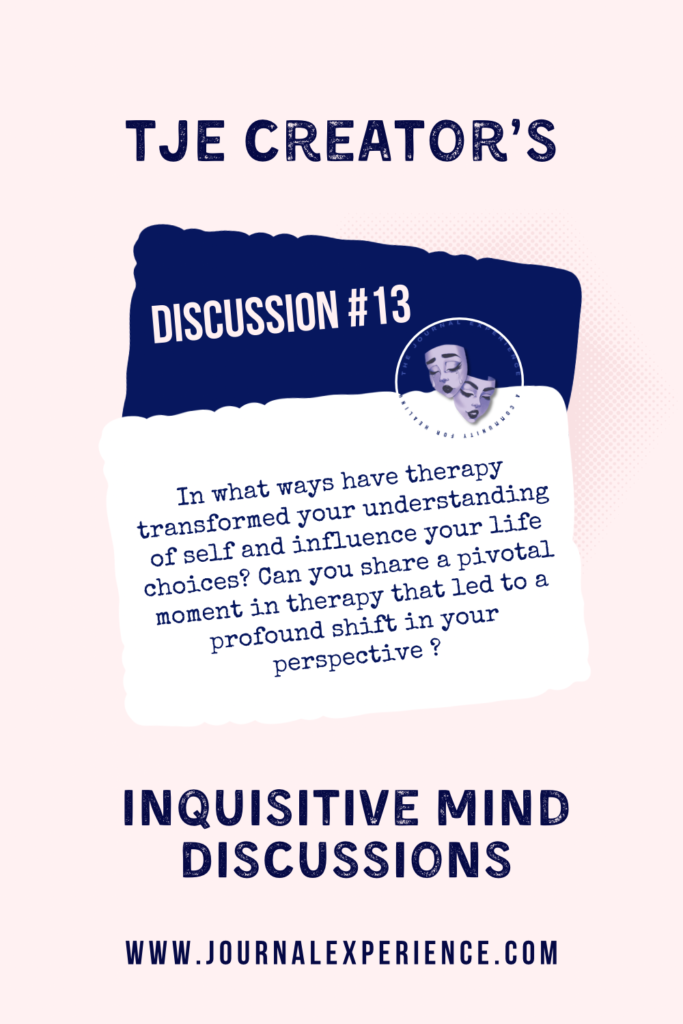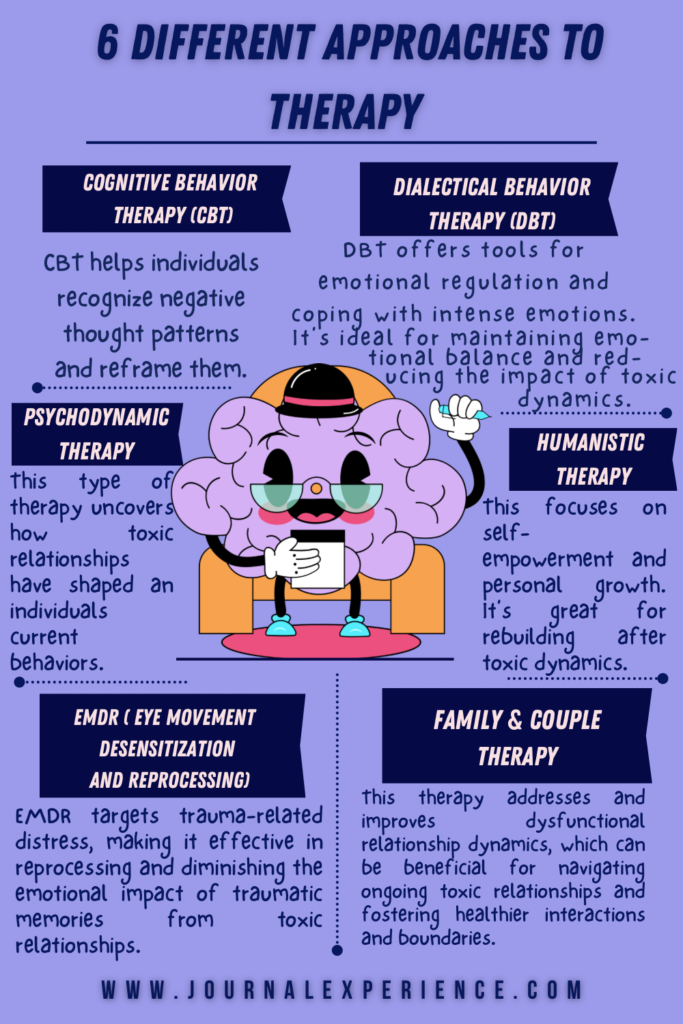Understanding the importance of therapy is essential, particularly for those who have faced the turmoil of toxic relationships or are still entangled in such detrimental dynamics.

Therapy serves as a haven, a place where one can untangle the emotional knots and embark on a profound journey of healing.
Despite the lingering negative stigma around therapy, it holds the power to transform lives in remarkable ways. Studies reveal that around 75% of people who undergo therapy report significant mental health improvements, according to the American Psychological Association.
This post emphasizes the importance of therapy and explores how it can be a beacon of hope and transformation in the midst of challenging relationships.
The Importance of Therapy
Navigating Therapy Options: Exploring Different Approaches
When dealing with the emotional fallout from toxic relationships, choosing the right therapy is a crucial step towards healing. There are several approaches, each offering unique benefits tailored to different needs. Understanding these options can help you find the right fit:
- Cognitive Behavioral Therapy (CBT): This approach focuses on transforming negative thought patterns that are often ingrained by toxic interactions. For instance, someone who has been repeatedly told they are not good enough may start to believe it. CBT helps individuals recognize these harmful thoughts and reframe them, fostering a positive self-image and healthier mental habits. It is particularly effective for those dealing with anxiety, depression, and low self-esteem resulting from toxic relationships.
- Dialectical Behavior Therapy (DBT): DBT offers tools for emotional regulation and coping with intense emotions. It’s ideal for managing the chaos and emotional manipulation often found in toxic relationships. For example, individuals who experience extreme emotional responses or difficulty managing stress can benefit from DBT techniques like mindfulness and distress tolerance. These tools help in maintaining emotional balance and reducing the impact of toxic dynamics.
- Psychodynamic Therapy: This therapy digs deep into past experiences and trauma, helping individuals uncover how toxic relationships have shaped their current behavior. For example, someone who had a controlling partner may explore how this has impacted their self-worth and interpersonal relationships. This deeper understanding facilitates the resolution of old wounds, leading to profound personal growth and behavioral change.
- Humanistic Therapy: Humanistic therapy focuses on self-empowerment and personal growth. It is great for rebuilding self-esteem and self-worth that may have been eroded by toxic dynamics. For instance, a person who feels diminished by a past abusive relationship can rediscover their strengths and capabilities, leading to a renewed sense of purpose and confidence.
- EMDR (Eye Movement Desensitization and Reprocessing): EMDR targets trauma-related distress, making it effective in reprocessing and diminishing the emotional impact of traumatic memories from toxic relationships. For instance, someone who experiences flashbacks of a traumatic relationship can use EMDR to reframe these memories, reducing their emotional intensity and leading to greater emotional freedom.
- Family and Couples Therapy: This therapy addresses and improves dysfunctional relationship dynamics, which can be beneficial for navigating ongoing toxic relationships and fostering healthier interactions and boundaries. For example, a couple struggling with communication issues and power imbalances can learn to understand each other better and develop healthier patterns of interaction.
Each of these therapeutic approaches emphasizes the importance of therapy, providing a path to recovery and empowerment for those emerging from the shadows of toxic relationships.

Unlocking the Benefits: How Therapy Can Transform Lives
Therapy is a powerful tool for those looking to recover from the impact of toxic relationships. It provides not just a route to recovery but also a means to rebuild and thrive. By engaging in therapy, individuals can unlock a wealth of benefits that can fundamentally transform their lives:
- Emotional Healing: Therapy offers a supportive environment to process and heal from the deep emotional scars left by toxic interactions. For example, a person who has been emotionally manipulated may struggle with trust issues. Through therapy, they can work through these emotions, gradually rebuilding their capacity to trust others.
- Increased Self-Esteem: Therapy helps rebuild a sense of self-worth and confidence that toxic relationships often undermine. For instance, individuals who have been belittled or criticized can develop a healthier self-view, recognizing their value and potential.
- Improved Relationships: Therapy provides skills for healthier communication and boundary-setting, essential for fostering positive relationships in the future. For example, learning to assertively communicate needs and expectations can help in forming more balanced and respectful relationships.
- Reduced Anxiety and Depression: Therapy is highly effective in alleviating symptoms of anxiety and depression. Someone who experiences panic attacks or depressive episodes due to past trauma can find relief and management strategies through therapy.
- Enhanced Self-Awareness: Therapy encourages introspection and understanding of personal behaviors and patterns influenced by past relationships. Someone may discover that their fear of abandonment stems from early toxic interactions. This leads to greater insight and the ability to make conscious changes.
- Better Coping Strategies: Therapy equips individuals with practical tools to handle stress, emotional triggers, and challenges more effectively. Learning techniques such as mindfulness or cognitive restructuring can help manage emotional responses and reduce the impact of stressors.
- Empowerment: Therapy empowers individuals to take control of their lives and make healthier choices. This set the stage for personal growth and resilience. Someone who has felt powerless can regain a sense of control and agency through therapy.
These benefits illustrate the importance of therapy in one’s life. This also provides a foundation for recovery and paving the way for a more fulfilling future. Therapy is not just a means to cope but a transformative experience that can lead to lasting positive change.
Empowering Change: Strategies for Finding the Right Therapist
Finding the right therapist is a crucial step in the healing journey, especially after experiencing toxic relationships. Here are some strategies to help you navigate this process and ensure a positive therapeutic experience:
- Identify Your Needs: Reflect on what you hope to achieve in therapy. Consider your goals and any specific issues you want to address, such as dealing with trauma from toxic relationships. For example, are you looking to manage anxiety, overcome a specific traumatic event, or improve your self-esteem?
- Research Different Therapists: Look for therapists who specialize in areas relevant to your needs. Online directories and referrals can be valuable resources. For example, a therapist with experience in domestic abuse might be particularly helpful for someone leaving a toxic partnership.
- Check Credentials and Experience: Ensure that the therapist is licensed and has experience working with individuals recovering from toxic relationships. Their background should align with your therapeutic needs. A therapist with a track record of helping clients overcome relationship trauma can provide the expertise and support needed for your situation.
- Read Reviews and Ask for Referrals: Reviews and referrals from trusted sources can provide insight into a therapist’s effectiveness and approach. This can help you make an informed decision. For example, feedback from former clients can give you a sense of the therapist’s style and effectiveness in addressing issues similar to yours.
- Consider Therapy Approach: Choose a therapy type that resonates with you, whether it’s CBT, DBT, or another approach. Aligning the approach with your personal preferences can enhance the therapy experience. For instance, if you prefer a structured approach to understanding and changing behavior, CBT might be a good fit.
- Schedule Initial Consultations: Meet with a few therapists to see who you feel most comfortable with. An initial consultation can help you gauge their approach and whether it suits your needs. For example, a consultation can help you determine if a therapist’s style is supportive and matches your communication preferences.
- Evaluate Comfort and Compatibility: It’s essential to feel safe and understood by your therapist. Trust and rapport are critical for effective therapy, especially when dealing with sensitive issues like toxic relationships. For example, you should feel that your therapist listens to you without judgment and understands your experiences.
- Consider Practicalities: Think about location, session availability, and cost. Ensure that the logistics fit your schedule and budget to maintain consistency in your therapy sessions. For example, choosing a therapist whose office is conveniently located or who offers flexible scheduling can help ensure that you can attend sessions regularly.
- Don’t Be Afraid to Switch: If a therapist isn’t the right fit, it’s okay to look for someone else. The goal is to find someone who supports and empowers your journey to recovery. For instance, if you feel that a therapist isn’t addressing your needs or you don’t feel comfortable, it’s important to find one who better aligns with your goals.
Taking these steps can help you find a therapist who meets your needs and emphasizes the importance of therapy, providing a supportive environment for healing and growth, enabling you to move forward from the impact of toxic relationships.

A Journey to Wellness: Realizing the Potential of Therapy
Therapy is more than a process; it’s a journey to wellness and self-discovery. For those who have faced the challenges of toxic relationships, therapy can be a transformative experience that fosters profound personal growth and healing.
Imagine a life where the emotional weight of past toxic interactions no longer holds you back. Therapy offers a pathway to this reality, enabling you to reclaim your strength and rebuild your sense of self. As you engage in therapy, you begin to see changes that ripple through every aspect of your life:
- Reclaiming Your Voice: Therapy helps you find and assert your voice, allowing you to set boundaries and communicate effectively, free from the shadows of toxic relationships. For example, learning to express your needs and preferences assertively can help you establish healthier, more respectful relationships. This might mean setting boundaries with a former partner or learning to say no without guilt in new relationships.
- Embracing Self-Worth: Through the therapeutic process, you start to see yourself in a new light, recognizing your value and embracing a renewed sense of self-worth and confidence. For instance, therapy can help you challenge and overcome negative self-beliefs instilled by toxic relationships, leading to a stronger sense of self. This renewed self-worth can manifest in various areas of life, such as career, personal interests, and social interactions.
- Building Resilience: Therapy equips you with the tools to face life’s challenges with resilience and grace, transforming adversity into opportunities for growth. For example, developing coping strategies for dealing with stress and setbacks can empower you to handle difficult situations more effectively, turning potential crises into opportunities for learning and development.
- Fostering Healthy Relationships: As you heal, you learn to cultivate healthy, meaningful connections that are based on respect, trust, and mutual support. For instance, understanding and establishing healthy boundaries can help you form relationships that are balanced and supportive, free from the toxic dynamics you’ve experienced in the past.
- Finding Inner Peace: Therapy guides you towards a state of inner peace, helping you to let go of past hurts and embrace a future filled with hope and possibility. This might include techniques such as mindfulness and meditation, which can foster a sense of calm and presence, allowing you to live more fully in the moment and reduce the impact of past traumas.
- Achieving Personal Growth: Therapy often leads to significant personal growth, helping you discover new strengths, passions, and aspects of your identity that may have been suppressed by toxic relationships. This could mean exploring new hobbies, pursuing educational or career goals, or developing new social networks that support and enrich your life.
- Improving Overall Well-Being: Engaging in therapy can enhance your overall well-being, leading to improvements in mental, emotional, and even physical health. For example, reduced stress and anxiety can contribute to better sleep, improved physical health, and a more positive outlook on life, enhancing your overall quality of life.
These stories of transformation are testaments to the power of therapy and highlight the importance of therapy in fostering personal growth and well-being. They show that with the right support and dedication, it is possible to heal, grow, and thrive beyond the confines of toxic relationships.
Overview
Recognizing therapy as a beacon of hope amidst the complexities of toxic relationships can illuminate the path to profound personal growth and transformation. It serves not only as a sanctuary for healing but also as a catalyst for resilience and empowerment.
Therapy empowers individuals to reclaim their lives, rebuild their sense of self, and forge a future filled with possibility and fulfillment.

Subscribe to our newsletter for insightful articles, expert tips, and practical advice on navigating toxic relationships and embracing the healing power of therapy. Start your path towards a healthier, happier life now.